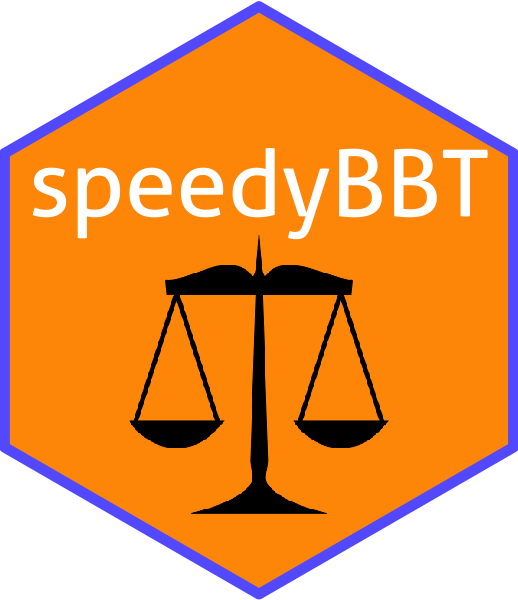
The hardware and bandwidth for this mirror is donated by dogado GmbH, the Webhosting and Full Service-Cloud Provider. Check out our Wordpress Tutorial.
If you wish to report a bug, or if you are interested in having us mirror your free-software or open-source project, please feel free to contact us at mirror[@]dogado.de.

📦 The speedyBBT R package allows you to perform fast
and efficient Bayesian inference for the Bradley–Terry model. The
package estimates the object qualities using a data augmentation method
with Polya-Gamma prior distributions. This makes carrying out a Bayesian
analysis of comparative judgement data quick and easy.
You can install speedyBBT by calling the following
commands:
install.packages("speedyBBT")
#devtools::install_github("rowlandseymour/BSBT", dependencies = TRUE) #for development versionThe code chunks below show how to use the package to fit the
Bradley–Terry model to a data set relating to forced marriage. Judges
were shown pairs of wards and asked which had a higher rate of forced
marriage. We can use the speedyBBTm function to draw
samples for the full conditional distributions for the ward quality
parameters. We place a multivariate normal prior distribution on the
ward quality parameters. The covariance matrix of this prior
distribution is constructed using a network representation of the wards
in Nottinghamshire.
#View Data
data("forcedMarriage", package = "speedyBBT")
head(forcedMarriage$comparisons)
#Construct covariance matrix
expA <- expm::expm(forcedMarriage$adjacencyMatrix)
sigma <- diag(diag(expA)^-0.5) %*% expA %*% diag(diag(expA)^-0.5)
#Fit model
forcedMarriageModel <- speedyBBTm(outcome = rep(1, length(forcedMarriage$comparisons$win)),
player1 = forcedMarriage$comparisons$win,
player2 = forcedMarriage$comparisons$lost,
player.prior.var = sigma)
forcedMarriageModel$lambda <- forcedMarriageModel$lambda - rowMeans(forcedMarriageModel$lambda)
#View Trace Plots
plot(forcedMarriageModel$lambda[, 10], type = 'l',
xlab = "Iteration", ylab = expression(lambda[10]))
plot(forcedMarriageModel$lambda[, 20], type = 'l',
xlab = "Iteration", ylab = expression(lambda[20]))
plot(forcedMarriageModel$lambda[, 30], type = 'l',
xlab = "Iteration", ylab = expression(lambda[30]))
plot(forcedMarriageModel$lambda[, 40], type = 'l',
xlab = "Iteration", ylab = expression(lambda[40]))
plot(forcedMarriageModel$alpha.sq, type = 'l')
#View Results
forcedMarriageModelMeans <- colMeans(forcedMarriageModel$lambda[-c(1:50), ])
forcedMarriageModelLowerCI <- apply(forcedMarriageModel$lambda[-c(1:50), ], 2, quantile, 0.025)
forcedMarriageModelUpperCI <- apply(forcedMarriageModel$lambda[-c(1:50), ], 2, quantile, 0.975)
forcedMarriageResults <- data.frame("ward" = forcedMarriage$wards$NAME,
"mean" = forcedMarriageModelMeans,
"lowerCI" = forcedMarriageModelLowerCI,
"upperCI" = forcedMarriageModelUpperCI)
forcedMarriageResults <- forcedMarriageResults[order(forcedMarriageResults$mean), ]
plot(forcedMarriageResults$mean, xlab = "Ward", ylab = "Posterior Mean", ylim = c(-7.5, 7.5))
segments(x0 = 1:nrow(forcedMarriageResults), y0 = forcedMarriageResults$lowerCI,
y1 = forcedMarriageResults$upperCI)This work is supported by the a UKRI Future Leaders Fellowship [MR/X034992/1], the Engineering and Physical Sciences Research Council [grant numbers EP/T003928/1, EP/R513283/1], the Economic and Social Sciences Research Council [ES/V015370/1] and the Research England Policy Support Fund.
The Dar es Salaam comparative judgement dataset was collected by Madeleine Ellis, James Goulding, Bertrand Perrat, Gavin Smith and Gregor Engelmann. We gratefully acknowledge the Rights Lab at the University of Nottingham for supporting funding for the comprehensive ground truth survey. We also acknowledge Humanitarian Street Mapping Team (HOT) for providing a team of experts in data collection to facilitate the surveys. This fieldwork was also supported by the EPSRC Horizon Centre for Doctoral Training - My Life in Data (EP/L015463/1) and by EPSRC grant Neodemographics (EP/L021080/1).
The data in Nottinghamshire was collected with support from the Nottinghamshire Slavery Multi Agency Risk Assessment Conference. Data in South Yorkshire was collected with support from South Yorkshire Police. Data in Wokingham was collected with support from Wokingham Council. Data in Oxfordshire was collected with support from Oxford Against Cutting. Data in West Yorkshire was collected with support from West Yorkshire Police and Karma Nirvana.
These binaries (installable software) and packages are in development.
They may not be fully stable and should be used with caution. We make no claims about them.
Health stats visible at Monitor.